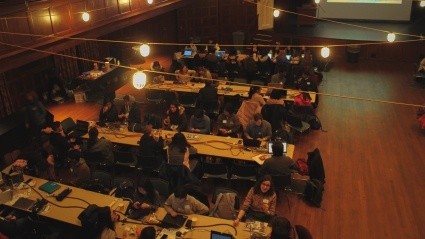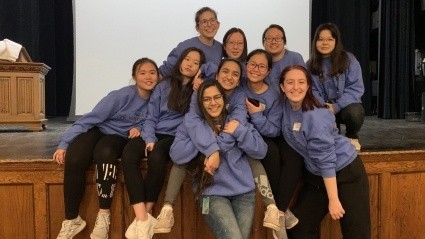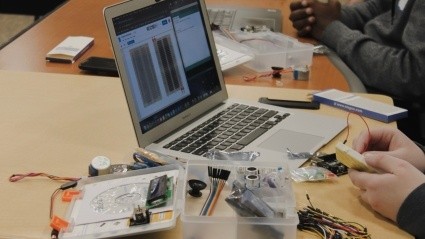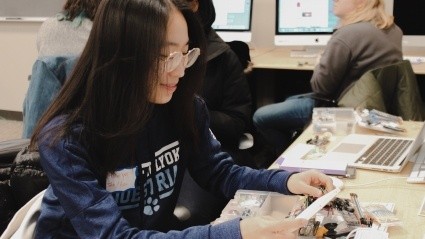HackHolyoke 2019
From computer code to microprocessors, HackHolyoke at Mount Holyoke College is for every hacker, regardless of skill or experience.
It’s hour 20 of the fifth annual HackHolyoke and Chapin Auditorium is abuzz. Groups of four or five students sit at long tables crisscrossing the space. They gaze intently at laptops, fiddle with circuit boards, eat pizza, take notes. The room hums with conversation, laughter and an occasional whoop or high-five. Everyone looks focused, if a bit bleary-eyed.

Hosted by Mount Holyoke College, HackHolyoke invites college students from around the country to team up to hack — create — a product or application of value in less than 24 hours. It’s designed for everyone from the complete novice to the experienced hacker. Participants learn about computers, electronics, collaboration, technology and more. Demystifying computers, coding and maker culture is a central feature.
Also of utmost importance to HackHolyoke, founded in 2014 by students, is achieving a 1-to-1 gender ratio — the first hackathon to do so. This year’s event is overseen by a team of 10 student organizers, headed up by juniors Haya Diwan and Khanh Ngo.

About 160 students took up the challenge this year, most from schools across Massachusetts and Connecticut — some from as far away as Georgia, Colorado and Montreal. Many were computer science and math majors. Others major in art, anthropology, film studies and English, to name a few. Their projects vary as widely as their academic disciplines.

Some teams form around common interests and use software exclusively. In honor of 2019 being the International Year of the Periodic Table, three chemists and a neuroscientist — Mount Holyoke seniors J Byun and Wenyun Wang and juniors Kiki Wang and Yaling Qing — are using Java GUI to create a game about the table.
“We understand the periodic table can look really scary, so we're trying to make a fun, nerdy-but-cool table,” said Kiki Wang. “You can click on the elements and a window will pop up and tell you a joke or a fun fact. There’s a kind of quiz, a guessing game where the user thinks of an element they like and the game will guess what it is. We can get what you’re thinking in less than 10 questions.”

Other teams also incorporated hardware such as Arduino open-source microprocessors, resistors and capacitors.
Mount Holyoke sophomores Sophie Vincent and Rose Sheehan, and senior Carolyn Knote wanted to build a version of the game Simon that creates sequences tones and lights. They needed to use Arduino, but none of them knew anything about it. So they all attended an introductory workshop on hardware led by Shani Mensing ’15, the Fimbel Maker & Innovation Lab coordinator. Other workshops included web development, music and technology, and the ethics of artificial intelligence, and all were taught by professors and technical experts.

“I did HackHolyoke because I wanted to spend time creating my own project,” said Sheehan. “I had no plans to work with hardware but I'm really glad that I got to try it. I had never worked with hardware before and it was a rewarding learning curve, to be able to go from zero to a finished piece of work.”
Funding for the event, which included an array of food, coffee and a nap room, came from lead donor Google, along with Raymond James, MassMutual, Dell, Yelp, Pivotal and Amazon. HackHolyoke also featured in-person mentoring from an array of campus experts, including faculty and staff from LITS and the Fimbel Lab. Several sponsors also sent software engineers, many of whom were alumnae and HackHolyoke veterans.
“HackHolyoke is a very low-pressure way to immerse in a project and challenge yourself to try something new,” said Sheehan. “I’ll definitely be back!”
The 2019 HackHolyoke projects, with winners noted, have been posted.